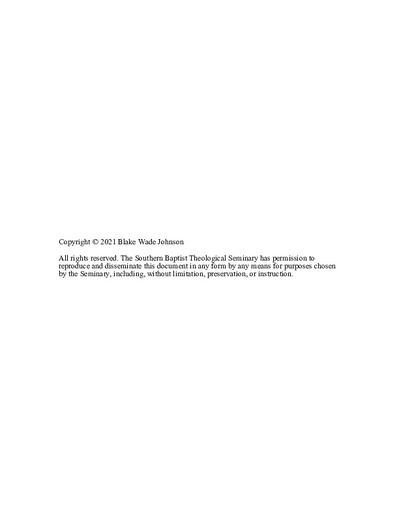| dc.contributor.advisor | Allison, Gregg R. | |
| dc.contributor.author | Johnson, Blake | |
| dc.date.accessioned | 2021-11-23T14:54:16Z | |
| dc.date.available | 2021-11-23T14:54:16Z | |
| dc.date.issued | 2021-11-17 | |
| dc.identifier.uri | https://hdl.handle.net/10392/6645 | |
| dc.description.abstract | This thesis examines the common ground between 1689 Federalism and Progressive Covenantalism, which warrants a closer identification between the two than currently exists. I demonstrate that Progressive Covenantalism carves out a place on the continuity/discontinuity spectrum whereas 1689 Federalism connotates emphasizes a particular relationship between the Old and New covenants while placing the same emphasis as PC on the newness of the New Covenant. Therefore, 1689 Federalists should view themselves as a subset of Progressive Covenantalism rather than as a variety of Covenant Theology.
Chapter 1 summarizes the history of both systems and details the thesis and methodology used to advance the argument. Chapter 2 presents the published interactions between the two systems to-date, highlighting the problems of mischaracterization and misunderstanding that have unnecessarily divided them. Chapter 3 presents the extent of the priorities shared by each system. Chapter 4 focuses on the central point that is said to divide PC and 1689 Federalism: the Law. Broad and narrow priorities are compared and
reflected upon. Chapter 5 concludes with several suggested benefits to be gained through a closer alignment between PC and 1689 Federalism. | en_US |
| dc.subject.lcsh | Covenant theology | en_US |
| dc.subject.lcsh | Reformed Baptists--Doctrines | en_US |
| dc.title | One Position, Two Administrations: Exploring the Theological Overlap Between 1689 Federalism and Progressive Covenantalism | en_US |
| dc.type | Electronic thesis | en_US |
| dc.type | Text | |
| dc.type.qualificationname | Th.M. | en_US |
| dc.publisher.institution | Southern Baptist Theological Seminary | en_US |
| dc.publisher.department | School of Theology | |

